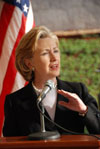
Secretary Clinton touched down in the Democratic Republic of the Congo today, where she said she would press the Congolese government to address the root causes of the more than a decade of violence in the eastern region that – with an estimated 5.4 million people dead – is the world’s deadliest conflict zone.
"I will be pressing very hard not just for assistance to help those being abused and mistreated … particularly the women who are being turned into weapons of war through the rape they experience … but also for ways to try to end this conflict," Clinton told reporters, according to Reuters.
Secretary Clinton signaled that she is particularly concerned about the links between the shocking prevalence of rape in Congo and the trade in minerals, which funds the armed groups that perpetrate the violence.
On Tuesday morning, Clinton will travel to Goma, the capital of North Kivu province, which is at the epicenter of the violence. The visit – which will include meetings with President Joseph Kabila, displaced people living in Mugunga II camp, NGO representatives, and U.N. officials – gives the secretary the chance to "speak out against the unspeakable violence against women and girls in eastern Congo," she said. "It is the worst example of man’s inhumanity to women, and women are being used in conflicts."
The focus of Clinton’s remarks, as she previewed them today, is on-point with the line advocacy groups, including Enough, have encouraged the secretary to take.
Enough Co-founder John Prendergast said he was encouraged by the secretary’s remarks as she arrived in Congo:
The Congo has become the most dangerous place in the world to be a woman or a girl, as rape has become a routine tool of war and social control. US involvement should be as multifaceted as the complex causes. A central focus for follow up should be on the fuel that drives the violence: the contest over the conflict minerals extracted from the eastern war zone and helping to power our electronics industry. Until the trade in minerals becomes legal and transparent, there will be no peace in Congo. Secretary Clinton’s remarks to reporters today signal that she understands very well these ties between the conflict mineral trade and the appalling prevalence of rape in eastern Congo."
A coalition of 88 humanitarian and human rights groups issued a statement today calling on Secretary Clinton to press the Congolese government and the U.N. mission in Congo, or MONUC, to instate more effective measures to protect civilians and bring perpetrators to justice.
“The U.N.-backed offensive that was supposed to make life better for the people of eastern Congo is instead becoming a human tragedy,” said Marcel Stoessel, head of Oxfam in DRC. “Secretary Clinton needs to make it very clear that US support for the U.N.’s efforts in Congo is not a blank check and that civilians should be protected.”
U.N. peacekeepers have been backing Congolese military operations, known as Kimia II, against the Rwandan Hutu rebel group, the Democratic Forces for the Liberation of Rwanda (FDLR), since March. This support followed earlier joint operations between the Congolese and Rwandan armies against the rebel group.
As one of the main financial backers of the U.N. peacekeeping force, the US government has an opportunity to spotlight the deficiencies in civilian protection in a way that will reverberate within MONUC and the Congolese government. She can capitalize on this occasion by pushing for a more thorough assessment of the risks to civilians in the U.N.’s operations and concrete action by the U.N. and the Congolese government to mitigate such risks, with specific attention to protecting women and girls from rape. Olivia Caeymaex, Enough’s Goma-based field research, signaled that the secretary’s visit will be an important first step towards more attentive US engagement:
Ending impunity for rape and other serious crimes needs to be at the heart of any strategy to combat sexual violence. Secretary Clinton should ensure US diplomatic and financial assets are focused on bringing to justice those who are most responsible.
For Enough’s coverage of Secretary Clinton’s first trip to Africa, check out our special page.
Photo: Secretary Clinton visits the U.S. Embassy in Nairobi. For more photos from the secretary’s trip, visit the State Department’s flicker page.

